No products in the cart.

Photo by: https://unsplash.com/@mbaumi
When I was growing up, one thing I was told to be proud of was Singapore’s ability to overcome flash and prolonged floods. It is no easy feat and many countries will testify to that. However, our current reality is such that I am not sure if this story of triumph will continue forever. In recent years, we have started to experience more extreme weathers here. Many of us can relate to how it can be scorching hot at one moment, and soon after, we are hit by rainstorms.
Some of these recent storms were so heavy that to our dismay, we saw some streets and neighbourhoods covered in water, overwhelming our otherwise effectively-designed drainage systems. As a result, we hear stories on how we need to build more infrastructure to manage these weather events that Mother Nature unleashed upon us. Even then, it might be disconcerting to learn that despite all these efforts, we might only be able to mitigate the effects rather than completely solve the root problems. We have to consider the prospect that we have to adapt to a “new normal”.
What has changed since I was growing up? Just as how a fever would tell us that something is not right with our body, extreme weather events serve as warnings from Mother Nature. The earth which has nourished us and provided us with so much is groaning from abuse.
While we might be tempted to leave it to the government and various institutions to manage and solve these problems, let us not forget that as individuals, our actions contribute to the problem. At the same time, we can also contribute to the solution.
We can start by recognising that the environment is not God’s gift solely for one’s self, but one that is meant for everyone. If we recognise that we have duties towards the human person, we cannot ignore our duties to the environment. These two duties are intertwined and cannot be disassociated, and so, to uphold one while ignoring the other would be wrong and hypocritical (Caritas in Veritate, 48, 51). Thus, to care for the environment is to care for other people too.
This might sound cliché or we might have heard this for the umpteenth time, but it is so important that it is worth reminding one another over and over again. Let us not just hear with our ears, but let us truly listen with our hearts, so that this call may assimilate into our lives.
We should also remember not to let the perfect become the enemy of the good. No individual action of ours is too small. All our little acts such as reducing/rejecting excessive consumption, recycling, reusing, and adopting sustainable lifestyles will add up and become a significant contribution to the good of humanity and the environment. After all, as the saying goes, “Sedikit sedikit, lama-lama menjadi bukit.”It means that bit by bit, over time, it will accumulate into a mountain.
If you are unsure ofhow to start, why not take up the challenge of examining your personal relationship with creation at http://www.ecologicalexamen.org/?
Related News
- The true cost of demand for cheap clothes, to you and the environment (Channel NewsAsia, 15 Apr 2021)
- Recent flooding shows importance of planning for climate change, says Grace Fu (Channel NewsAsia, 19 Apr 2021)
- Public encouraged to join new programme to tackle plastic waste (The Straits Times, 20 Apr 2021)
Jacob Soo is the Membership Executive at Caritas Singapore and serves at the Cathedral of the Good Shepherd. He finds joy in strong cups of black coffee, Catholic spirituality books, and conversations on the faith.
